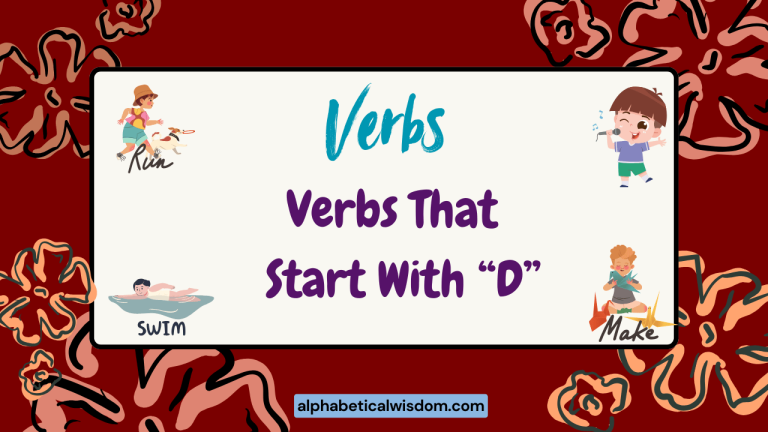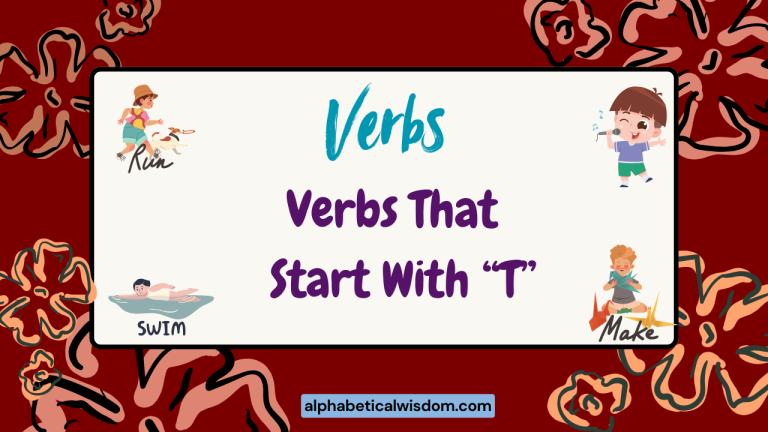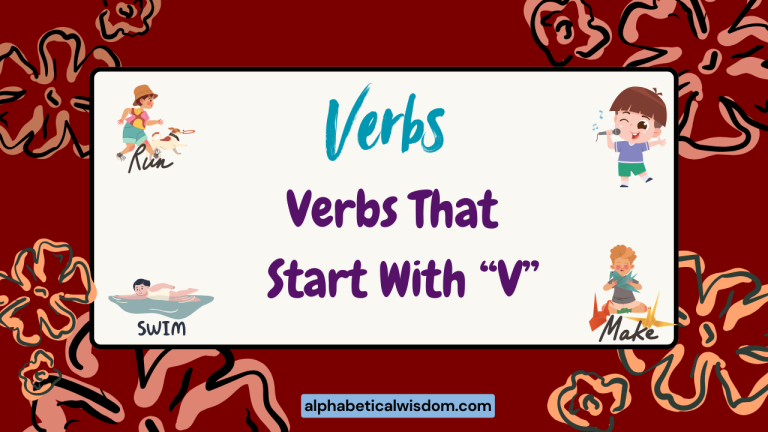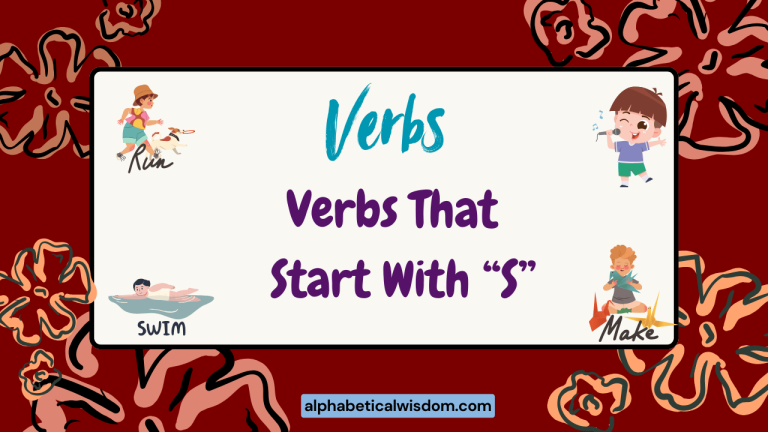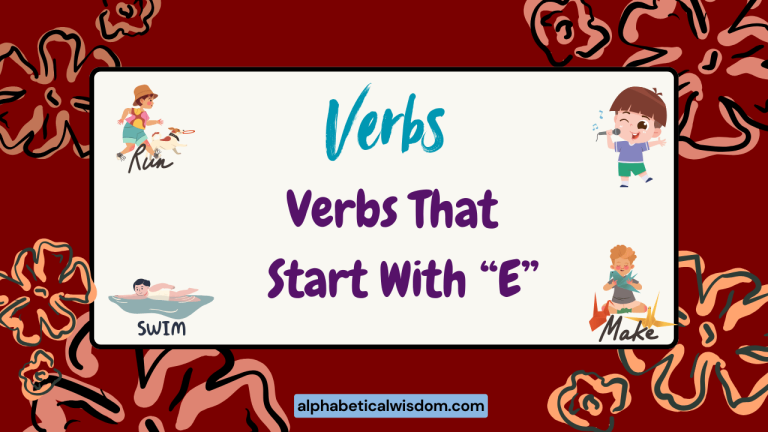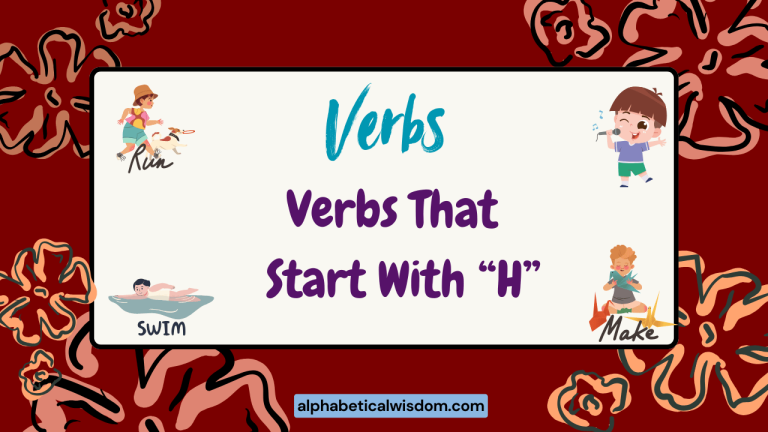Verbs Starting With G: A Comprehensive Grammar Guide
Understanding verbs is fundamental to mastering English grammar. Verbs that start with the letter “G” are particularly diverse, covering a wide range of actions, states, and processes.
This article provides an in-depth exploration of these verbs, offering definitions, examples, and usage rules to help learners of all levels improve their command of the English language. Whether you’re a beginner or an advanced student, this guide will equip you with the knowledge and practice you need to use “G” verbs effectively.
Table of Contents
- Introduction
- Definition of Verbs Starting with G
- Structural Breakdown of ‘G’ Verbs
- Types and Categories of ‘G’ Verbs
- Examples of ‘G’ Verbs in Sentences
- Usage Rules for ‘G’ Verbs
- Common Mistakes with ‘G’ Verbs
- Practice Exercises
- Advanced Topics
- Frequently Asked Questions (FAQ)
- Conclusion
Definition of Verbs Starting with G
A verb is a word that describes an action, occurrence, or state of being. Verbs are essential components of sentences, as they express what the subject is doing or experiencing.
Verbs starting with “G” encompass a broad spectrum of meanings, from simple actions like “go” and “give” to more complex concepts such as “generate” and “govern.” Understanding these verbs and how they function is crucial for effective communication in English.
Verbs can be classified in various ways, including by their function (action, stative, linking), by their transitivity (transitive, intransitive), and by their regularity (regular, irregular). Each classification helps to define the verb’s role in a sentence and its grammatical behavior.
For example, an action verb describes a physical or mental action, while a stative verb describes a state of being or a condition. Transitive verbs require a direct object, while intransitive verbs do not.
Regular verbs form their past tense and past participle by adding “-ed,” while irregular verbs have unique forms.
Structural Breakdown of ‘G’ Verbs
The structure of ‘G’ verbs, like all verbs, can be analyzed based on their tense, aspect, and mood. Tense indicates the time of the action (present, past, future).
Aspect describes the duration or completion of the action (simple, continuous, perfect). Mood expresses the speaker’s attitude towards the action (indicative, imperative, subjunctive).
For instance, the verb “grow” can be used in different tenses and aspects: “I grow flowers” (present simple), “I am growing flowers” (present continuous), “I grew flowers” (past simple), “I have grown flowers” (present perfect). Each form conveys a different nuance of the action.
Understanding these structural elements allows for precise and effective communication.
Types and Categories of ‘G’ Verbs
Action Verbs
Action verbs describe physical or mental actions. They are dynamic and indicate that the subject is performing an action.
These verbs are often used to describe activities, processes, and events.
Stative Verbs
Stative verbs describe a state of being, a condition, or a mental state. They do not typically describe actions that are in progress.
Examples include verbs related to emotions, thoughts, and senses.
Transitive Verbs
Transitive verbs require a direct object to complete their meaning. The direct object receives the action of the verb.
For example, in the sentence “She gave a gift,” “gave” is a transitive verb, and “a gift” is the direct object.
Intransitive Verbs
Intransitive verbs do not require a direct object. They can stand alone or be followed by an adverbial phrase.
For example, in the sentence “They go,” “go” is an intransitive verb.
Regular Verbs
Regular verbs form their past tense and past participle by adding “-ed” to the base form. For example, the past tense of “grab” is “grabbed,” and the past participle is also “grabbed.”
Irregular Verbs
Irregular verbs do not follow the standard “-ed” rule for forming their past tense and past participle. They have unique forms that must be memorized.
For example, the past tense of “give” is “gave,” and the past participle is “given.”
Examples of ‘G’ Verbs in Sentences
The following tables provide examples of ‘G’ verbs categorized by their type. Each table includes a variety of verbs and sentences to illustrate their usage.
Action Verb Examples
The table below showcases action verbs starting with ‘G’ and their usage in sentences. These verbs denote physical or mental actions that the subject performs.
| Verb | Example Sentence |
|---|---|
| Gallop | The horse galloped across the field. |
| Gamble | He likes to gamble at the casino. |
| Gather | We need to gather the necessary information. |
| Gaze | She gazed at the stars in wonder. |
| Generate | The wind turbines generate electricity. |
| Get | I need to get groceries from the store. |
| Give | Please give me your attention. |
| Glide | The bird glided effortlessly through the air. |
| Glimpse | I glimpsed her in the crowd. |
| Glisten | The morning dew glistened on the grass. |
| Glitter | The decorations glittered under the lights. |
| Glorify | The song glorifies the heroes of the past. |
| Glow | The embers glowed softly in the fireplace. |
| Gnaw | The dog gnawed on the bone. |
| Go | We should go to the beach this weekend. |
| Govern | The government governs the country. |
| Grab | Grab your coat before we leave. |
| Graduate | She will graduate from college next year. |
| Grant | The university granted him a scholarship. |
| Grasp | He couldn’t grasp the complex concept. |
| Greet | They greeted us warmly at the door. |
| Grin | He grinned at her joke. |
| Grip | She gripped the railing tightly. |
| Groan | He groaned in pain. |
| Groom | The cat grooms itself meticulously. |
| Ground | The airplane was grounded due to bad weather. |
| Group | We need to group these items together. |
| Grow | Plants grow best in sunlight. |
| Guarantee | The company guarantees satisfaction. |
Stative Verb Examples
The table below illustrates stative verbs starting with ‘G’. These verbs express states of being, beliefs, or conditions rather than actions.
| Verb | Example Sentence |
|---|---|
| Guess | I guess that’s the right answer. |
| Gather (meaning: understand) | I gather that you’re not happy with the results. |
| Grieve | She grieved over the loss of her friend. |
| Glow (meaning: feel satisfaction) | They glowed with pride after their child’s success. |
| Grateful | I am grateful for your help. |
| Get (meaning: understand) | I get your point now. |
Transitive Verb Examples
This table provides examples of transitive verbs starting with ‘G’, which require a direct object to complete their meaning.
| Verb | Example Sentence |
|---|---|
| Gain | She gained a lot of experience. |
| Give | He gave her flowers. |
| Govern | The council governs the city. |
| Grab | He grabbed the opportunity. |
| Grant | They granted him asylum. |
| Grasp | She grasped the concept quickly. |
| Greet | They greeted the guests. |
| Grind | They grind the coffee beans. |
| Grow | They grow vegetables in their garden. |
| Guarantee | The store guarantees the quality. |
Intransitive Verb Examples
Below are examples of intransitive verbs starting with ‘G’, which do not require a direct object.
| Verb | Example Sentence |
|---|---|
| Glow | The fireflies glowed in the night. |
| Go | They go to the park every day. |
| Grow | The plants grow quickly in the spring. |
| Gamble | He likes to gamble at the casino. |
| Grieve | She grieved for weeks after the loss. |
Regular Verb Examples
This table shows regular verbs starting with ‘G’, which form their past tense and past participle by adding ‘-ed’.
| Verb | Past Tense | Past Participle | Example Sentence |
|---|---|---|---|
| Grab | Grabbed | Grabbed | He grabbed the keys and left. |
| Gaze | Gazed | Gazed | She gazed out the window. |
| Greet | Greeted | Greeted | They greeted us at the door. |
| Glow | Glowed | Glowed | The lights glowed in the distance. |
| Ground | Grounded | Grounded | The pilot grounded the plane. |
| Group | Grouped | Grouped | The students were grouped into teams. |
Irregular Verb Examples
The table below presents irregular verbs starting with ‘G’, which have unique past tense and past participle forms.
| Verb | Past Tense | Past Participle | Example Sentence |
|---|---|---|---|
| Give | Gave | Given | He gave her a present. |
| Go | Went | Gone | They went to the store. |
| Get | Got | Gotten/Got | She got a new job. |
| Grind | Ground | Ground | The coffee was ground this morning. |
| Grow | Grew | Grown | The flowers have grown tall. |
Usage Rules for ‘G’ Verbs
Understanding the rules governing the use of ‘G’ verbs is essential for constructing grammatically correct sentences. These rules include subject-verb agreement, tense consistency, and the proper use of gerunds and infinitives.
Subject-Verb Agreement
Subject-verb agreement means that the verb must agree in number with its subject. If the subject is singular, the verb must be singular.
If the subject is plural, the verb must be plural. For example, “He goes” (singular) and “They go” (plural).
Example: The girl giggles (singular). The girls giggle (plural).
Tense Consistency
Tense consistency requires that the tense of the verb remains consistent within a sentence or paragraph unless there is a logical reason to change it. For example, if you start a story in the past tense, you should generally continue in the past tense.
Example: Incorrect: She went to the store and then she goes home. Correct: She went to the store and then she went home.
Gerunds and Infinitives
Some verbs are followed by gerunds (verb + -ing), while others are followed by infinitives (to + verb). Knowing which form to use is important for correct grammar.
Some verbs can be followed by either, but the meaning may change.
Example: He enjoys gambling (gerund). He wants to go (infinitive).
Common Mistakes with ‘G’ Verbs
Even experienced learners make mistakes with verbs. Here are some common errors with ‘G’ verbs and how to correct them:
| Incorrect | Correct | Explanation |
|---|---|---|
| She gived him a book. | She gave him a book. | “Gived” is not the correct past tense of “give.” The correct form is “gave.” |
| He goed to the store. | He went to the store. | “Goed” is not the correct past tense of “go.” The correct form is “went.” |
| They are go to the party. | They are going to the party. | The correct form in the present continuous tense is “going.” |
| I getted a new car. | I got a new car. | “Getted” is not the correct past tense of “get.” The correct form is “got.” |
| She growed flowers in her garden. | She grew flowers in her garden. | “Growed” is not the correct past tense of “grow”. The correct form is “grew”. |
Practice Exercises
Test your understanding of ‘G’ verbs with the following exercises.
Exercise 1: Fill in the Blanks
Fill in the blanks with the correct form of the verb in parentheses.
| Question | Answer |
|---|---|
| 1. She ________ (give) me a present yesterday. | gave |
| 2. They ________ (go) to the beach every summer. | go |
| 3. He is ________ (get) ready for the party. | getting |
| 4. The plants ________ (grow) quickly in the spring. | grow |
| 5. I ________ (guess) that’s the right answer. | guess |
| 6. She ________ (grab) her coat and left. | grabbed |
| 7. They ________ (greet) us warmly at the door. | greeted |
| 8. The fireflies ________ (glow) in the dark. | glowed |
| 9. He ________ (govern) the country for ten years. | governed |
| 10. I ________ (gather) that you are not happy. | gather |
Exercise 2: Correct the Errors
Identify and correct the errors in the following sentences.
| Question | Answer |
|---|---|
| 1. He gived me a ride to school. | He gave me a ride to school. |
| 2. She goed to the store yesterday. | She went to the store yesterday. |
| 3. They are go to the movies tonight. | They are going to the movies tonight. |
| 4. I getted a new phone for my birthday. | I got a new phone for my birthday. |
| 5. The flowers growed beautifully in the garden. | The flowers grew beautifully in the garden. |
| 6. She grabed the opportunity with both hands. | She grabbed the opportunity with both hands. |
| 7. They greated us with smiles on their faces. | They greeted us with smiles on their faces. |
| 8. The sun glowed brightly in the sky. | The sun glowed brightly in the sky. (No error) |
| 9. He govern the country with wisdom and fairness. | He governs the country with wisdom and fairness. |
| 10. I gathere that you are not satisfied with the results. | I gather that you are not satisfied with the results. |
Exercise 3: Sentence Construction
Create a sentence using each of the following verbs in the tense indicated.
| Verb | Tense | Sentence |
|---|---|---|
| Give | Past Simple | She gave a presentation yesterday. |
| Go | Present Continuous | They are going to the concert tonight. |
| Get | Past Perfect | He had gotten a promotion before he left the company. |
| Grow | Future Simple | The company will grow significantly next year. |
| Guess | Present Simple | I guess that is the correct answer. |
| Grab | Past Continuous | He was grabbing his bag as he ran out the door. |
| Greet | Present Perfect | They have greeted all the guests already. |
| Glow | Past Simple | The candles glowed softly in the room. |
| Govern | Future Continuous | The new president will be governing the country next year. |
| Gather | Past Perfect Continuous | They had been gathering information for months before the report was published. |
Advanced Topics
For advanced learners, understanding phrasal verbs and idiomatic expressions involving ‘G’ verbs can significantly enhance their fluency.
Phrasal Verbs with ‘G’
Phrasal verbs are combinations of a verb and a preposition or adverb. They often have meanings that are different from the individual words.
Examples include “get along” (have a good relationship), “give up” (stop trying), and “go on” (continue).
Here are some examples of phrasal verbs with ‘G’:
- Get away: to escape
Example: The thief tried to get away from the police. - Get by: to manage with difficulty
Example: It’s hard to get by on such a small salary. - Get over: to recover from an illness or disappointment
Example: It took her a long time to get over the breakup. - Give in: to surrender or yield
Example: The company finally gave in to the workers’ demands. - Give away: to donate or reveal a secret
Example: She gave away all her old clothes. - Go through: to experience or examine
Example: He had to go through a lot of hardship. - Go on: to continue or happen
Example: The meeting will go on until 5 PM. - Grow up: to mature or become an adult
Example: I grew up in a small town.
Idiomatic Expressions with ‘G’ Verbs
Idiomatic expressions are phrases whose meanings cannot be understood from the literal meanings of the individual words. They add color and nuance to the language.
Examples include “give someone a hand” (help someone) and “go the extra mile” (do more than is expected).
Here are some idiomatic expressions using ‘G’ verbs:
- Give someone the cold shoulder: to ignore someone
Example: She gave him the cold shoulder after their argument. - Go bananas: to become very excited or crazy
Example: The crowd went bananas when the band came on stage. - Get something off your chest: to express something that has been bothering you
Example: I needed to get that off my chest. - Go with the flow: to adapt to circumstances
Example: Just go with the flow and enjoy the trip. - Give someone a piece of your mind: to scold someone
Example: I’m going to give him a piece of my mind for being late.
Frequently Asked Questions (FAQ)
Here are some frequently asked questions about using verbs starting with ‘G’:
- What is the difference between “give” and “grant”?
“Give” generally means to transfer possession of something, while “grant” means to formally give or allow something, often a right or privilege. For instance, you “give” a gift, but you “grant” permission.
- How do I know when to use “go” versus “gone”?
“Go” is the base form of the verb. “Went” is the past tense, and “gone” is the past participle. Use “gone” with auxiliary verbs like “have,” “has,” or “had.” For example, “I go to the store,” “I went to the store,” and “I have gone to the store.”
- What are some common mistakes with the verb “get”?
Common mistakes include using “getted” instead of “got” as the past tense and misusing phrasal verbs with “get.” Always remember that the past tense of “get” is “got,” and pay attention to the specific meanings of phrasal verbs like “get up,” “get along,” and “get over.”
- Is “grow” a regular or irregular verb?
“Grow” is an irregular verb. Its past tense is “grew,” and its past participle is “grown.” It does not follow the standard “-ed” rule.
- How can I improve my understanding of phrasal verbs with “G”?
The best way to improve your understanding of phrasal verbs is through exposure and practice. Read widely, listen to native speakers, and try to use phrasal verbs in your own writing and speaking. Pay attention to the context in which they are used to understand their specific meanings.
- What is the difference between a transitive and an intransitive verb, and how does it affect sentence structure?
A transitive verb requires a direct object to complete its meaning, while an intransitive verb does not. For example, “She gave a gift” (transitive, “a gift” is the direct object) versus “They go” (intransitive, no direct object). The presence or absence of a direct object determines the sentence structure.
- How do I use “govern” correctly in different contexts?
“Govern” can refer to political rule or to control or influence something. For example, “The government governs the country” or “He governs his emotions well.” Ensure that the context is clear and that the subject is appropriate for the action.
- When should I use the subjunctive mood with a ‘G’ verb?
The subjunctive mood is used to express wishes, suggestions, or hypothetical situations. Although less common in modern English, it can still appear with verbs like “grant” in formal contexts. For example, “I suggest that the university grant him a scholarship” (subjunctive “grant” instead of “grants”).
- How can I remember the irregular forms of ‘G’ verbs like ‘give’ and ‘go’?
Use flashcards, practice writing sentences, and try to use the verbs in conversation. Repetition and context are key to memorizing irregular verb forms. You can also use online resources and apps that provide quizzes and exercises.
- What are some common idioms using verbs that start with ‘G’?
Some common idioms include “give someone the cold shoulder,” “go bananas,” and “get something off your chest.” Understanding these idioms can add color and nuance to your language. Try to learn a few new idioms each week and use them in your conversations.
Conclusion
Mastering verbs starting with the letter “G” is an essential step in improving your English grammar skills. By understanding the different types of verbs, their structures, and usage rules, you can communicate more effectively and accurately.
Remember to practice regularly, pay attention to common mistakes, and explore advanced topics like phrasal verbs and idiomatic expressions. With dedication and consistent effort, you can confidently use “G” verbs in your everyday communication.
Keep practicing the exercises provided in this article, and don’t hesitate to consult additional resources for further learning. Consistent practice and exposure to the language will help solidify your understanding and improve your fluency.
Good luck on your journey to mastering English grammar!

